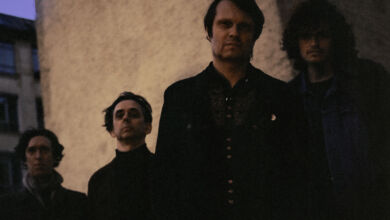
Twinkle
Golden Lights (RPM 108)
This neat compilation will be warmly welcomed by those of you who have spent far too much time, effort and money tracking down the various singles, EPs and other collections of the work completed in the brief career of 60’s teen phenomenon Twinkle.
Lynn Annette Ripley was just 16 when she recorded her notorious hit single, ‘Terry’, a moody tale of a teenage girl’s morbid obsession with her suicidal biker boyfriend. Backed by a sharp, slicing guitar riff and a creepy organ whine, with a soft echo to Twinkle’s barely developed voice, and predictably banned by the BBC, ensuring legendary status and regular plays when Auntie Beeb amended her opinion of it. It’s the first track here, and is doubtlessly the most familiar to the casual buyer.
‘The Boy Of My Dreams’ takes us to a safer, teen-schlock territory, with a Helen Shapiro style delivery to a song that uses Buddy Holly guitar stylings all to very good effect.
Although not nearly as big a hit as ‘Terry’, ‘Golden Lights’ is surely her finest song, with its gentle swaying rhythm, subtle backing and plaintive lyric about the successful pop star who conveniently forgets the girl he knew before he was famous. Famously covered by The Smiths in the 80’s, it’s Twinkle’s own version that proves the more effective, her barely-there voice expressing the forgotten girl’s anger without any hint of theatricality. The song takes a distinctly dark turn toward the end, all the more surprising in an age when the UK pop industry routinely demanded innocence and lightness of tone from its young female stars, and rarely allowed them the privilege of writing their own material.
‘Ain’t Nobody Home But Me’s barrelhouse piano, and Twinkle’s jaunty, Glenda Collins-style delivery makes for a pleasant slice of silliness, with a cheeky, teasing lyric that wouldn’t have been out of place in the Victorian Music Hall.
‘Tommy’ aims for charming naivety, harking back to the finger-snapping smooch of the 1950’s, and could have been from a particularly saccharine musical of that by-then seemingly distant decade.
‘So Sad’ sees our girl in Peter, Paul and Mary mode, the happy riff and echoing vocal putting over some sweet, if predictable socially concerned lyrics.
‘A Lonely Singing Doll’ is a fine cover, an English language version of Eurovision winner ‘Poupee De Cire, Poupee De Son’. The pizzicato strings and Twinkle’s matter of fact delivery evoke an unnerving atmosphere, but given that the original was written by king of Gallic perv-pop Serge Gainsbourg , it appears to be in perfect keeping with the song’s message.
‘Unhappy Boy’s bright production and sparkly tune belies the downbeat lyric, but suffers from a lack of sustain in the voice.
‘Poor Old Johnny’s nod to Country and Western, with its piano roll intro, leads us into another crying song. Looking back over a long-ago affair with another unsuitable boy, this one ending up in prison, Twinkle sounds a little insecure with the singing style.
‘I Need your Hand In Mine’ has a high, piping organ intro, and her breathy voice handles this sad song well, even carrying a hint of Francoise Hardy in the delivery. The organ sound adds a fairground atmosphere to the song, always a good standby. ‘The End Of the World’ is another saccharine weepie, with Twinkle’s naïve-style delivery proving the best solution to the often over the top miserable lyrics.
‘Take Me To The Dance’ has a Chiffons-style atmosphere, with added tinkling pianos and a voice with a winsome giggle to it, mischievously delivering phrases like ‘pounding throbbing beat’. Easily the best realised production here, and a little reminiscent of The Searchers’ ‘Every Time That You Walk In The Room’ this is one style that Twinkle should perhaps have persisted with.
‘What Am I Doing Here With You’ has lashings of naughty humour, and ‘Now I Have You’ appears to be a stab at sounding like some of her pop contemporaries. Its ghostly echo recalls the distinctive production of Joe Meek, and it is tempting to wonder what such collaboration might have produced.
‘Micky’ seems to be caught between a Northern Soul beat and a West End show, but is hugely enjoyable, it’s ‘Ha Hey Hey Hey’s prove a welcome departure for the usually morose star.
‘Derby and Joan’ is pure music hall with added venom, and bears a resemblance to the sort of material Antony Newley was producing in his heyday. ‘Soldier’s Dream’ closes the CD, its protest/anti-war theme well realised, with a solemn spoken part for emphasis in what has to be her most mature work.
It would be unfair to subject such a small selection of songs over such a brief career, and from someone of rather tender years, to some kind of points system, and you can be sure I’m not going to do it here. Twinkle had an already mentioned rare privilege in the 60’s music world, and in her early, unrepeatable success, has been spared the slow decline that generally follows a massively successful career. Instead, she remains in a monochrome time-bubble, always blonde, head topped off with a cap, in a Breton jersey, ready to be discovered by another generation of 60’s obsessed youth. BUY HERE!








